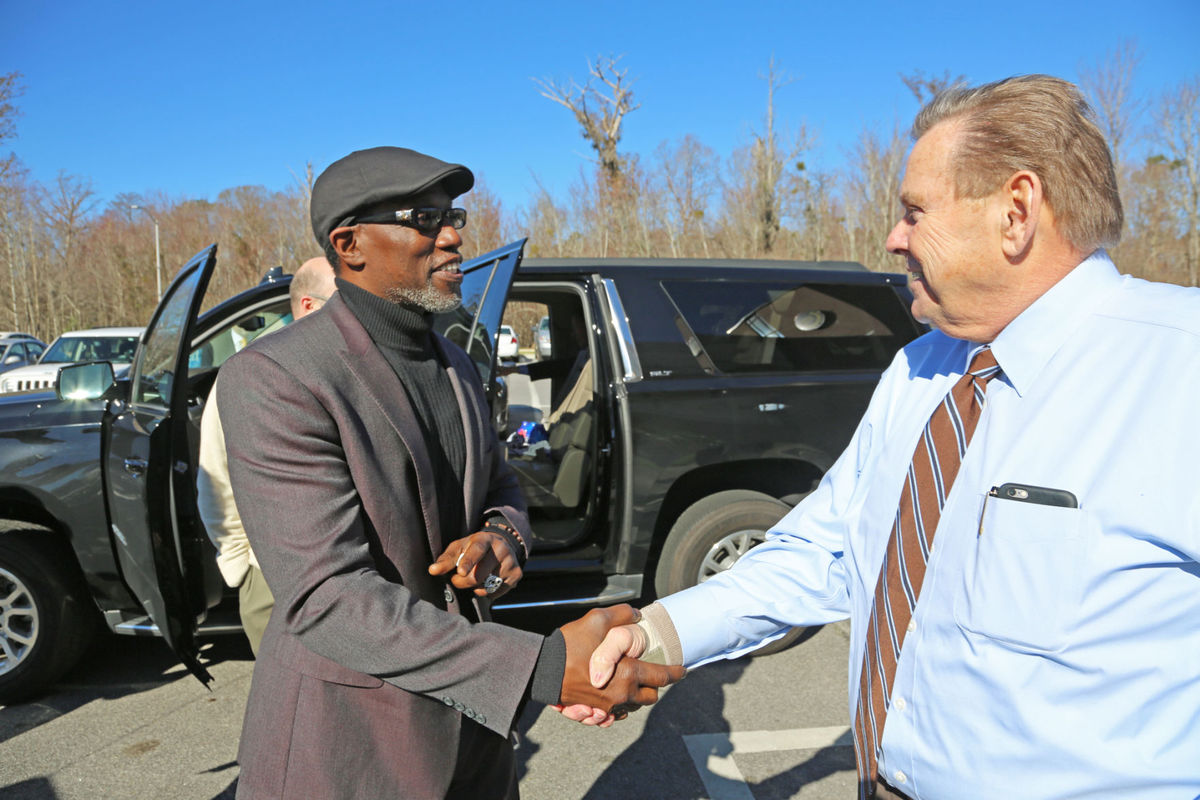
FLORENCE, S.C. – The Pee Dee got some serious star power Tuesday when Wesley Snipes visited the Southeastern Institute of Manufacturing and Technology, where a partnership with Florence-Darlington Technical College and the actor is in the works.
Snipes, a star of the big screen known to many from a trio of “Blade” films and classics such as “White Men Can’t Jump,” “Major League,” and “New Jack City,” has several projects in development in conjunction with the SiMT, and wanted to visit classrooms on campus and meet with professors and students.
“It’s pretty cool,” said Jonathan Spears, 19, who is working on his associate in arts degree and loves “Expendables 3.”
Amonte Askins, also 19, said he’d never before seen a celebrity or actor.
“It’s incredible,” said Askins, a business management major. “Wow.”
Mark Roth, vice president of the SiMT, said Snipes is working with the school in the areas of additive manufacturing and the 3-D Interactive Production Studio.
“He brings so much enthusiasm and so much talent and so many ideas of how we can partner,” said Dr. Ben Dillard, president of the college.
Following a private lunch, Snipes recalled how he first got into martial arts as an undersized 12-year-old growing up in a tough environment in New York City.
“Have you seen ‘The Warriors?’” he asked, referring to the 1979 movie about gangs in the Big Apple. “It was like that.”
Karate lessons at the YMCA led to dance lessons and an affinity for movement. Acting, he said, came by way of plays in middle school and being cast as the Mad Hatter in “Alice in Wonderland,” at age 10.
“When I sat on top of the mushroom and acted like the mushroom was making me all crazy the whole school started to laugh,” he said. “And I was like – hmmm, this works.”
His teacher called his mother and suggested Snipes should hone his talent; his mother was unaware there was a school to study theater and acting.
“My thing was the dance side – musical theater,” he said. “And she called up and I had to audition for the Performing Arts High School.”
There were tens of thousands of hopefuls, he said, but only a few were chosen. He was one of those picked.
“If you get in, you get in,” he said.
After two and a half years, his sister was born and his mother relocated the family to Orlando, Florida.
“I thought that was the end of my career – not my career, my happiness,” he said, laughing. “I didn’t have a career at the time. My happiness was destroyed, going to Florida. Going to my mom’s high school – imagine that.”
His school had a choir and a marching band, but no acting. A good friend asked if he was interested in drama.
“Drama? Oh, here goes with some ‘ol Southern thing. I didn’t know what this is,” he said, laughing again.
Snipes was introduced to a humanities teacher and was told about an after-school program with plays and such, and was handed a script. He picked it up right away as he’d already had a couple of years of training.
“And that’s all we did every day,” he said. “And so that’s how the acting started down in Florida – thinking it was finished, a done deal from being in New York.”
He applied to State University of New York in Purchase, part of a consortium of schools focused on fine arts. After he graduated, he went out to find work.
“And I got a soap opera,” he said. “And that’s how it happened.”
Snipes joked that he tried to quit show business three times.
“It’s crazy, man. It’s antithetical to everything that’s normal,” he said.
Sniped shared a story about when he was in Bucharest, Romania, years ago and was not happy about the business aspect of show business. A chance encounter with an African exchange student gave him a different perspective.
“When I walked past him, he stopped,” as the student recognized him and said, ‘Hey. Wesley Snipes. Are you Wesley Snipes?’ I said, yeah, yeah, yeah.,” he said.
The student lived in England and said as a black man, he got no respect, was paid no attention.
“And when these movies with me, Laurence Fishburne, and these kinds of films started to come out, it was at that time, English people began to recognize him,” Snipes recalled. “So he says to me, ‘I don’t want you to ever stop what you’re doing. Because you don’t know how you affect people … When I’m in England, they don’t respect me. They don’t see me, I’m invisible. But after you do your movie … and Laurence Fishburne does his movies, now, they see me as a man. When I walk down the street, they look at me and say, you look like Wesley Snipes.”
Snipes exhaled heavily.
“I’m like, damn, man, why you’re going to hit me with this right now?,” he said, to much laughter.
Snipes has co-authored a supernatural novel, “Talon of God,” which is set to publish this summer. Writing, he said, is born from his “incessant creativity.”
As part of his many years of studying martial arts, spirituality and art “harmonize and resonate with each other,” he said. “ So for mastery, the great masters were not only skilled at combat, they were calligraphers, or they were artists of some other discipline.”
“I can move, I can act — OK, let me see if I can write,” he said.
He’s learned from others “better than I,” he said, to become more proficient. “I’ve got to be good physically, I’ve got to be good mentally, I’ve got to be good spiritually, and that’s just another way for me to express that.”